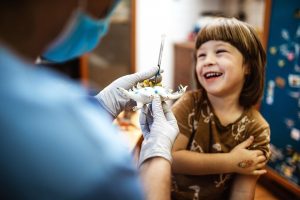
Molestowanie seksualne dziecka – jak rozpoznać i pomóc ofierze?
Spis treści:
Molestowane dziecko – jak je rozpoznać?
Molestowanie dzieci jest niezgodne z obowiązującym prawem – zarówno państwowym, jak i moralnym – w niemal wszystkich krajach na świecie. Jednakże dopiero w latach 80. zwrócono uwagę na ten problem społeczny – zaczęto go badać, prowadzić statystyki, a także wdrażać postępowania pomocowe i prewencyjne. Prowadzenie rejestru przestępstw seksualnych na osobach nieletnich jest trudne ze względu na to, że znaczna ich część nigdy nie wychodzi na jaw.
Nieletnie ofiary wykorzystywania seksualnego stosunkowo rzadko mówią głośno o niepożądanych kontaktach z osobą dorosłą. Dzieje się tak przede wszystkim dlatego, że sprawcą przemocy seksualnej zwykle jest osoba dobrze znana dziecku, ciesząca się jego zaufaniem. Co więcej, dzieci łatwo poddają się manipulacji – przestępca może im bez trudu wmówić, że takie zachowanie jest normą. Wobec tego warto być czujnym na różnego rodzaju zakamuflowane komunikaty, które podświadomie może wysyłać nam dziecko.
Przemoc seksualna odciska ogromne piętno na życiu dziecka. Niemniej warto pamiętać, że następstwa molestowania nieletniego uzależnione są od wielu czynników, np. od tego, kim jest sprawca przemocy, od wieku ofiary, a także jej cech osobniczych. Zdecydowanie najłatwiej rozpoznać ślady fizyczne – siniaki, otarcia, zranienia, choroby układu moczowo-płciowego, a także choroby weneryczne. U nastolatek następstwem kontaktów seksualnych z osobą dorosłą może być ciąża.
Wykorzystywanie seksualne niesie ze sobą również szereg konsekwencji emocjonalnych, które zdecydowanie trudniej rozpoznać. Jedną z charakterystycznych cech dzieci doświadczających przemocy seksualnej jest ich nadmierna seksualizacja, która może przejawiać się nieadekwatną wiedzą na temat seksu. Oprócz tego dzieci mogą mieć nadmierną skłonność do masturbacji, inicjowania i nawiązywania różnych kontaktów seksualnych, a także wykazywać przemocowe zachowania seksualne wobec osób młodszych lub słabszych fizycznie.
Dzieci, które doświadczyły kontaktów seksualnych z osobą dorosłą, często sprawiają problemy wychowawcze – wagarują, są nieposłuszne, nieobowiązkowe, konfliktowe i agresywne (zarówno w stosunku do rówieśników, jak i nauczycieli). Mają również problemy z nawiązywaniem relacji interpersonalnych. Z kolei młodsze dzieci mogą być opóźnione w rozwoju, zamknięte w sobie i wykazywać nieadekwatny lęk wobec innych.
Jak sprawdzić, czy dziecko jest molestowane?
Rozpoznanie ofiary molestowania seksualnego wymaga uważności na różnego rodzaju sygnały, które podświadomie dziecko może nam wysyłać. Zwykle nie mówi ono otwarcie o swoich doświadczeniach, gdyż może być zastraszone i zmanipulowane. Często też akt przemocy jest „tajemnicą”. Sprawca doskonale zdaje sobie sprawę, że jego czyny są karalne, dlatego robi wszystko, co w jego mocy, by prawda nie wyszła na jaw. Z jego ust mogą wypływać takie komunikaty: „Nie możesz tego powiedzieć mamusi, bo będzie ona smutna”; „Jak mnie kochasz, to nikomu nie powiesz, co się między nami stało”; „Takie rzeczy są całkowicie normalne i świadczą o dużej miłości”.
W drodze do ujawnienia prawdy o wykorzystywaniu seksualnym bardzo ważne jest zyskanie zaufania dziecka, rozmawianie z nim o różnych trudnościach, edukowanie go (stosownym językiem) na temat tego, czym jest przemoc seksualna. Ważnym warunkiem jest zapewnienie dziecku pełnej swobody i otwartości do wyrażania własnych myśli i odczuć. Jeśli nie wiemy, jak to zrobić, a podejrzewamy, że za zachowaniem dziecka kryje się coś niepokojącego, warto poprosić o pomoc specjalistę.
Dziecko będące ofiarą molestowania seksualnego często nosi ślady przemocy fizycznej. Dlatego też, jeśli mamy przypuszczenia, że jest ono ofiarą przemocy, warto udać się na konsultację z ginekologiem. Należy jednak pamiętać, że wykorzystywanie seksualne niekoniecznie może pozostawiać łatwe do zidentyfikowania ślady, bowiem nie zawsze wiąże się z penetracją.
Jak pomóc molestowanemu dziecku?
Kontakty seksualne dzieci z osobami dorosłymi często pozostawiają zadrę na psychice ofiary do końca życia. Warto jednak pamiętać, że im wcześniej przemocowe zachowania zostaną przerwane, tym większa szansa na zmniejszenie długofalowych konsekwencji wykorzystywania seksualnego. Podstawą jest nienegowanie emocji dziecka – jeśli zgłosi nam ono, że jest ofiarą przemocy, powinniśmy natychmiast zareagować. Konieczne jest zapewnienie nieletniemu bezpieczeństwa psychicznego i emocjonalnego, a także poproszenie o pomoc specjalisty – psychologa, psychiatry bądź psychoterapeuty. Molestowane dziecko może zmagać się z zespołem stresu pourazowego (PTSD).

Polecamy
Katarzyna Miller: brak edukacji seksualnej skazuje dzieci na wulgaryzm i pornografię
Ciągle mamy ciemnogród. Ciągle biedne dzieci pytają, czy od pocałunku zachodzi się w ciążę – mówi Katarzyna Miller. Psycholożka i psychoterapeutka podpowiada, jak przełamywać barierę wstydu, jak rozmawiać z dziećmi o seksie i jakie skutki rodzi brak takiej rozmowy. Ponadto wspomina swoją pierwszą wizytę u ginekologa i informacyjny zgrzyt, jakiego doświadczyła na linii córka-lekarz-matka.
Gdzie zgłosić molestowanie dziecka?
Jeśli podejrzewamy, że dziecko jest ofiarą przemocy (nie tylko seksualnej), powinniśmy to zgłosić na policję (numery: 112 lub 997). Dzieci, które potrzebują pomocy, mogą ją otrzymać, dzwoniąc na numer telefonu zaufania dla dzieci i młodzieży (116 111).
Jak zapobiegać molestowaniu dziecka?
Najważniejszym działaniem prewencyjnym przemocy seksualnej wobec dziecka jest edukacja w tym zakresie już od najmłodszych lat. Należy uczyć dziecko, że nikt – nawet rodzice – nie ma prawa dotykać w niestosowny sposób intymnych części jego ciała. Warto też przeprowadzić z nim rozmowę na temat seksualności – wyjaśnić, czym jest „zły dotyk”, uświadomić, że ciało jest jego własnością i nikt nie ma prawa dotykać go bez jego zgody. Mały człowiek powinien wiedzieć, że zawsze może zgłosić się do zaufanej osoby dorosłej, jeśli dojdzie do sytuacji, która budzi jego wątpliwości. Warto też stwarzać atmosferę otwartości i swobody mówienia o wszystkim bez wstydu i strachu.
Czym grozi molestowanie seksualne dzieci?
Molestowanie seksualne dzieci jest zakwalifikowane jako przestępstwo zagrożone karą pozbawienia wolności od 2 do 12 lat. Artykuł 200 Kodeksu karnego mówi, że: „Kto obcuje płciowo z małoletnim poniżej lat 15 lub dopuszcza się wobec takiej osoby innej czynności seksualnej lub doprowadza ją do poddania się takim czynnościom albo do ich wykonania, podlega karze pozbawienia wolności od lat 2 do 12″.
Z kolei inny artykuł (197 KK, § 3, pkt. 2) mówi, że jeśli sprawca dopuścił się aktu gwałtu na osobie nieletniej poniżej 15. roku życia, podlega karze pozbawienia wolności od 3 do 15 lat. Przy czym wymiar kary nie może być krótszy niż 3 lata, a jeśli sprawca czynu działał ze szczególnym okrucieństwem, to kara ta nie może być krótsza niż 5 lat.
Źródła:
- Gaberle-Fenik K., Kałucka R., Ujawnienie przez dziecko wykorzystywania seksualnego pracownikowi oświaty, Ośrodek Rozwoju Edukacji, Warszawa 2018.
- Jarząbek G., Pawalczyk M., Sowińska-Przepiera E., Problem ofiar przemocy seksualnej w praktyce ginekologii wieku rozwojowego, „Seksuologia Polska” 2005:3(2),s. 64–68.
- Malec A., Skutki wykorzystywania seksualnego dziecka,https://dzieckokrzywdzone.fdds.pl/index.php/DK/article/download/240/170(dostęp: 27.06.22).
- Sajkowska M., Wykorzystywanie seksualne dzieci, „Dziecko Krzywdzone. Teoria, badania, praktyka”, 2017:16(1); s. 232–251.
- Włodarczyk J., Wykorzystywanie seksualne w dzieciństwie a konsekwencje w życiu dorosłym. Raport z badań, Fundacja Dajemy Dzieciom Siłę, Warszawa 2016.












































